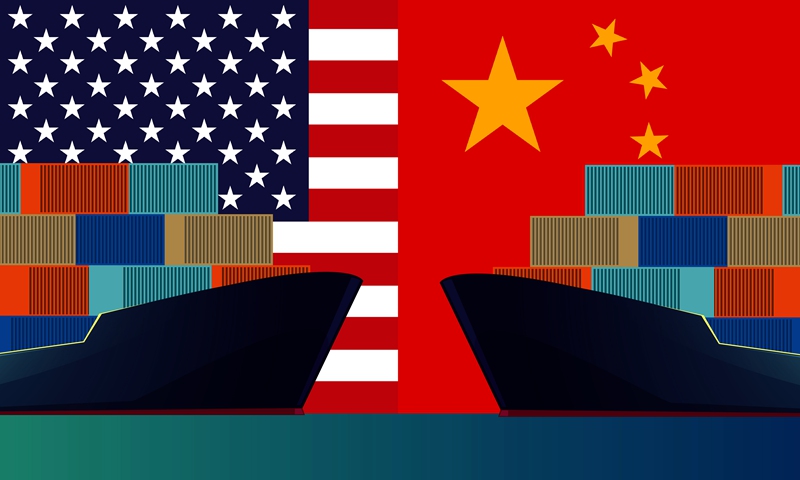Effective countermeasures to US decoupling policy against China

China US Photo:Global Times
On Monday, Hong Kong's benchmark Hang Seng Index fell 5 percent to its lowest closing level since March 2016, while the Hang Seng Technology Index sank 11 percent, the biggest one-day drop since the index went live in July 2020. In the US, the Nasdaq Golden Dragon China Index fell for a third straight session, dropping 12 percent. On Tuesday, Chinese stocks plunged.
This drop-offs in the stock market come on the heels of a warning from US officials that China should not help Russia, after news broke in the Western media that Russia has asked China for military help in Ukraine, a rumor China quickly denied. The US is spreading false news to damage Chinese companies and cause capital flight, resulting in an overall decline in stocks.
Wall Street traders didn't hesitate to react, "fearing that Beijing's closeness to Putin could trigger a worldwide boycott, or even sanctions, against Chinese companies."
This more or less smacks of conspiracy theory, but this is exactly a continuation of the US' decoupling policy toward China in recent years. Decoupling is not only in the high-tech sector, but also in the financial sector well. Since the US believes that its own high-tech must not be transferred to China, Chinese high-tech companies will not be allowed to raise capital through Wall Street.
The ultimate goal of the US and Western sanctions against Russia, apart from dismembering it, is to weaken Russia's economic power and squeeze it out of the global economic and trade chains, turning it into a second-class country that is incapable of participating in US-led globalization.
The "decoupling" of China has the same effect in both respects. But China is different from Russia. China does not just rely on industrial raw materials and low-end products to enter the global industrial chains. China relies on large-scale, multi-level, all-round manufacturing. This is China's advantage.
China does need to strive for more access to the high-end sectors in order to break the US blockade. However, China does need to further consolidate its position in the global industrial chain.
The reason why the US trade policy toward China is difficult to implement, and US-China trade is rising instead of falling, is that Chinese manufacturing has been deeply embedded in the US and global industrial and supply chains, and no other country can replace it.
We have the ability and strength to further integrate into global industrial and supply chains. This is the key to China in expanding its global influence and contributing to the global trade. If Chinese companies retreat to their home countries or withdraw from the industrial or supply chains at this time because of US crackdowns and blockades, the withdrawal would precisely coincide with Washington's strategic strikes.
Enterprises are the foundation of China's economic position in the global economy and the foundation of its capital power to the world. The world's financial systems are in the midst of profound adjustment, and China's ability to drive and participate in these adjustments still depends on the extent to which its companies participate in global development.
Chinese companies should not stop going global. They should instead speed up and expand their markets, scope of cooperation and pull on the manufacturing sector in emerging economies around the world. This is especially important in neighboring economies, implemented through the One Belt and One Road Initiative, and variety of means.
In particular, enterprises with leading technology like Huawei, while enhancing competitiveness, burst into the global market on all fronts to break through the US market squeeze. For enterprises with the strength to expand internationally, the country should give more policy supports. At the same time, China's capital strength should be the strong backing for the development of its enterprises. We should create conditions for these enterprises to stand up in the global capital market.
The author is a senior editor with People's Daily, and currently a senior fellow with the Chongyang Institute for Financial Studies at Renmin University of China. dinggang@globaltimes.com.cn. Follow him on Twitter @dinggangchina

